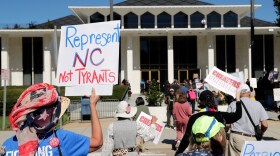A joint legislative committee finished up its work Wednesday on redrawing North Carolina's 13 congressional district boundaries, producing more than a dozen possible replacements. Now,the redistricting process must move through the house and senate with candidate filing for 2020 less than three weeks away.
Lawmakers are hustling to redraw the electoral boundaries after a Wake County Superior Court panel granted a preliminary injunction last month, blocking their use in next year's elections. The court indicated it was likely to find the Republican-controlled legislature unconstitutionally manipulated the district lines with extreme partisan bias, as the judges had already found with the state's legislative maps.
In the case challenging the congressional district lines, 14 Democratic-leaning voters claimed that Republican legislators either packed them into the same districts or split them up to lock in a 10 to 3 GOP majority in North Carolina's congressional delegation.
Candidate filing for 2020 is supposed to start Dec. 2. State elections officials have said new congressional district lines need to be in place by Dec. 15 to avoid pushing back North Carolina's March Super Tuesday primaries.
"We already have primary election participation in the low 20s, when it goes to a special date, that falls into the single digits," said Rep. David Lewis (R-Harnett), a joint redistricting committee co-chair, adding that his personal goal was to get a final replacement map through the legislature by the end of the day Thursday.
Under criteria adopted by the joint redistricting committee, legislators could not use partisan data and had to keep districts compact with equal populations. Sen. Dan Blue (D-Wake), a member of the joint redistricting committee, said he thought the legislature would agree on a final map before Thanksgiving.
"Figuring out which one has the best compactness scores because that should be critical," said Blue, holding a sheaf of 10 to 15 proposed replacement maps rolled up in his hand. "That tends to show you that you're not gerrymandering, if you're not having to meander around get all kinds of appendages in districts and stuff."
Before finishing its work, the joint redistricting committee held a public comment session Wednesday, giving people the chance to comment on the process. Most of those who spoke, and submitted comments online, criticized the redistricting process.
"Asking experienced legislators to draw their own maps without considering elections results or favoring themselves and their parties is a fool's errand," said Jennifer Bremer, with the League of Women Voters of North Carolina.
"As long as legislators draw the maps political bias is built into the process," she added, advocating for independent redistricting.
A house committee will take up the proposed replacement maps Thursday and work on narrowing the choices down to a final map to be sent to the full chamber. Then the process will move to the senate side.








